人教版七年级上册Unit 6Do you like bananas? Section B (3a~Self Check) 课件(共23张PPT)
文档属性
| 名称 | 人教版七年级上册Unit 6Do you like bananas? Section B (3a~Self Check) 课件(共23张PPT) |

|
|
| 格式 | pptx | ||
| 文件大小 | 1.1MB | ||
| 资源类型 | 教案 | ||
| 版本资源 | 人教新目标(Go for it)版 | ||
| 科目 | 英语 | ||
| 更新时间 | 2023-12-12 00:00:00 | ||
图片预览

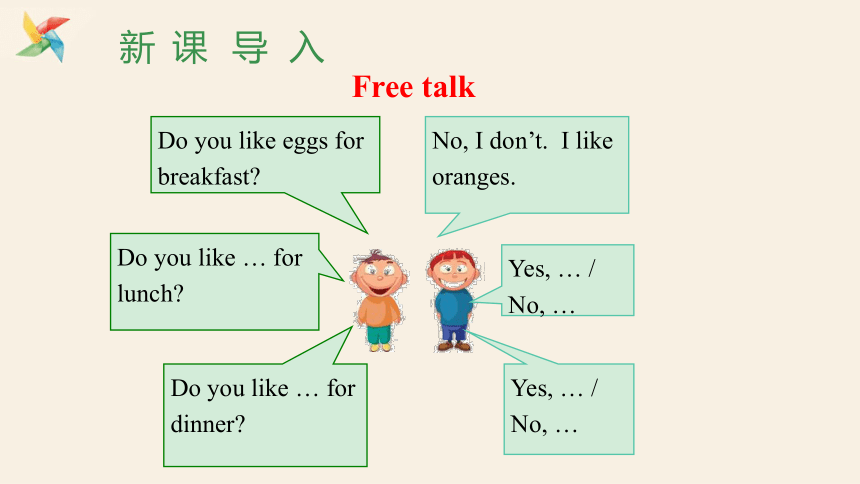
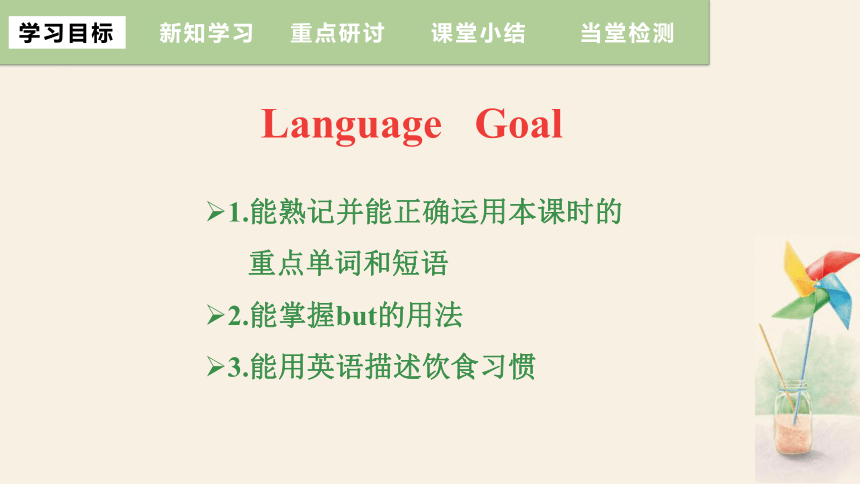

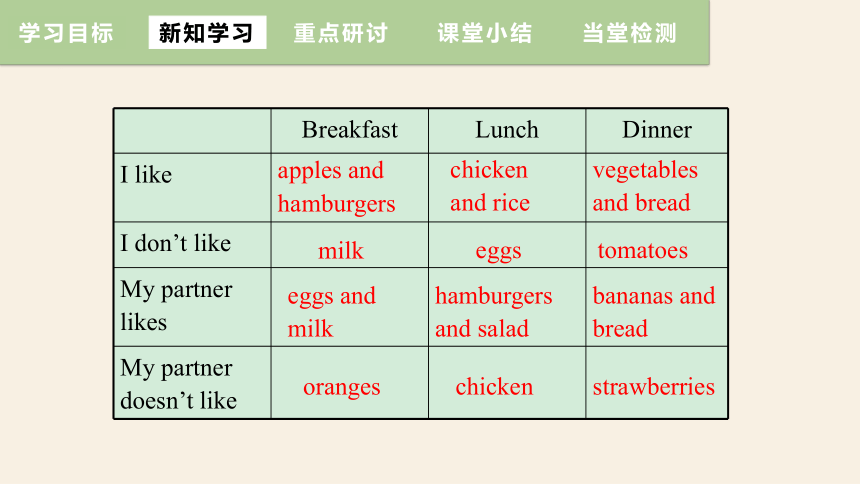
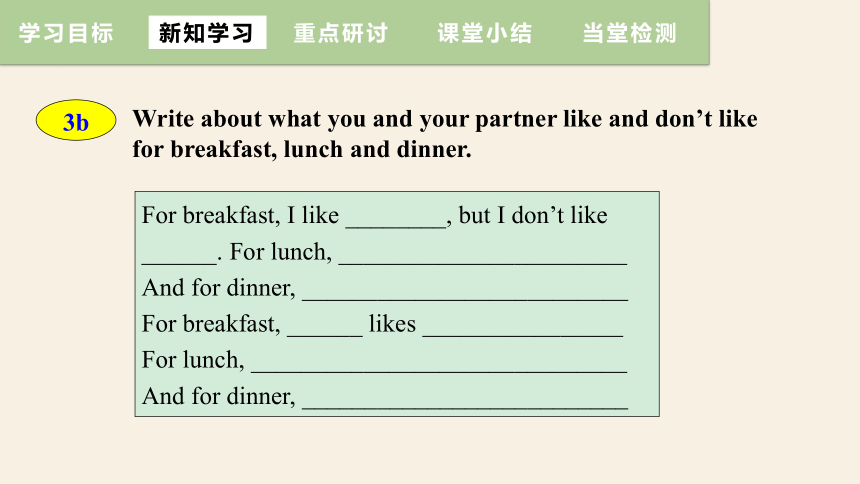
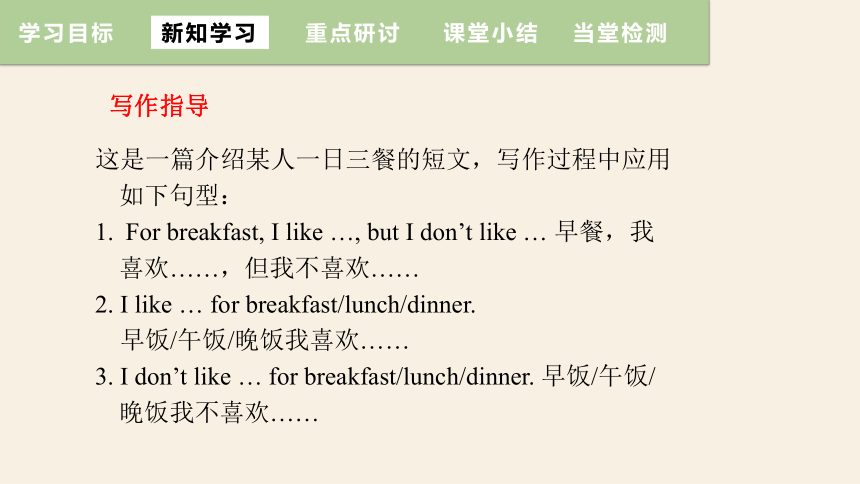
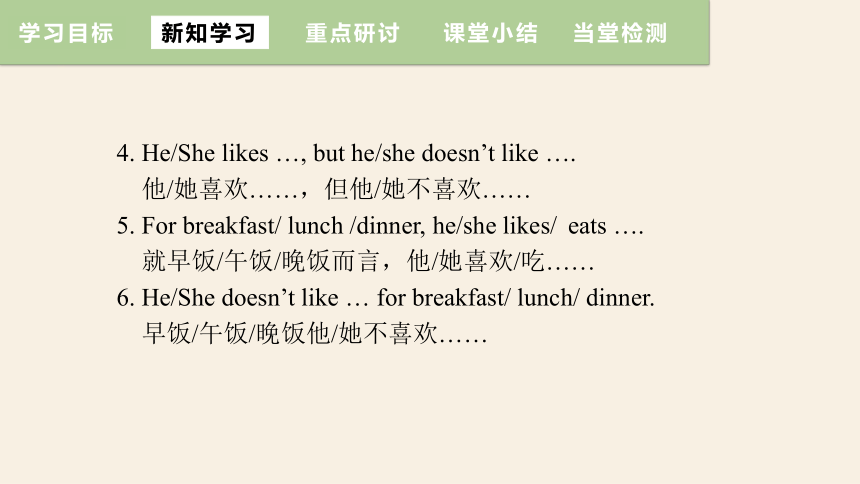
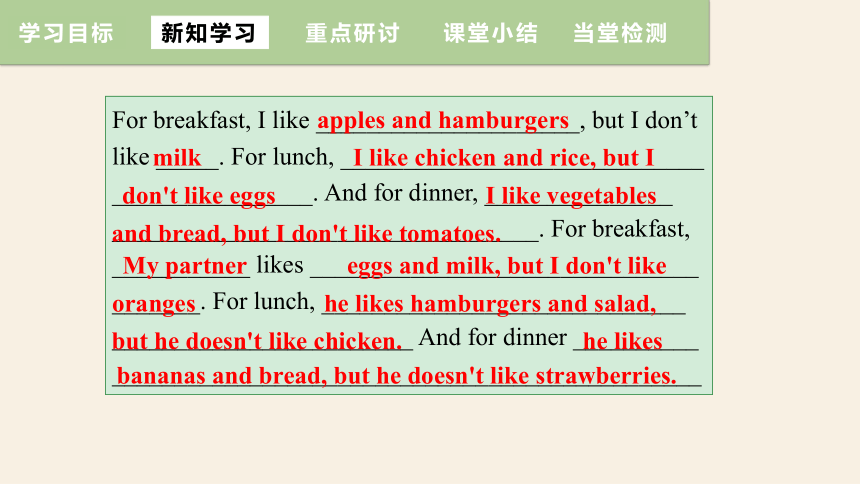
文档简介
(共23张PPT)
Unit 6
Do you like bananas
Section B (3a~Self Check)
新
课
导
入
Do you like eggs for breakfast
No, I don’t. I like oranges.
Do you like … for lunch
Yes, … /
No, …
Do you like … for dinner
Yes, … /
No, …
Free talk
Language Goal
新知学习
课堂小结
当堂检测
学习目标
重点研讨
1.能熟记并能正确运用本课时的
重点单词和短语
2.能掌握but的用法
3.能用英语描述饮食习惯
新知学习
课堂小结
当堂检测
学习目标
重点研讨
3a
Complete the survey.
--Do you like eggs for breakfast
--No, I don't. I like oranges.
--Do you like ...for lunch
--Yes, I do./ No, I don't.
--Do you like ... for dinner
--Yes, I do./ No, I don't.
新知学习
课堂小结
当堂检测
学习目标
重点研讨
Breakfast Lunch Dinner
I like
I don’t like
My partner likes
My partner doesn’t like
apples and
hamburgers
chicken and rice
milk
tomatoes
vegetables and bread
eggs
eggs and milk
hamburgers and salad
bananas and bread
oranges
chicken
strawberries
新知学习
课堂小结
当堂检测
学习目标
重点研讨
Write about what you and your partner like and don’t like
for breakfast, lunch and dinner.
3b
For breakfast, I like ________, but I don’t like ______. For lunch, _______________________
And for dinner, __________________________ For breakfast, ______ likes ________________ For lunch, ______________________________ And for dinner, __________________________
新知学习
课堂小结
当堂检测
学习目标
重点研讨
这是一篇介绍某人一日三餐的短文,写作过程中应用如下句型:
For breakfast, I like …, but I don’t like … 早餐,我喜欢……,但我不喜欢……
2. I like … for breakfast/lunch/dinner.
早饭/午饭/晚饭我喜欢……
3. I don’t like … for breakfast/lunch/dinner. 早饭/午饭/晚饭我不喜欢……
写作指导
新知学习
课堂小结
当堂检测
学习目标
重点研讨
4. He/She likes …, but he/she doesn’t like ….
他/她喜欢……,但他/她不喜欢……
5. For breakfast/ lunch /dinner, he/she likes/ eats ….
就早饭/午饭/晚饭而言,他/她喜欢/吃……
6. He/She doesn’t like … for breakfast/ lunch/ dinner.
早饭/午饭/晚饭他/她不喜欢……
新知学习
课堂小结
当堂检测
学习目标
重点研讨
For breakfast, I like _____________________, but I don’t like _____. For lunch, _____________________________
________________. And for dinner, _______________
__________________________________. For breakfast, ___________ likes _______________________________
_______. For lunch, _____________________________
________________________ And for dinner __________
_______________________________________________
apples and hamburgers
milk
I like chicken and rice, but I
don't like eggs
I like vegetables
and bread, but I don't like tomatoes.
My partner
eggs and milk, but I don't like
oranges
he likes hamburgers and salad,
but he doesn't like chicken.
he likes
bananas and bread, but he doesn't like strawberries.
新知学习
课堂小结
当堂检测
学习目标
重点研讨
Self check
1. Do you know the plurals of these words
Put them in the corrrect columns.
hamburger tomato carrot
photo banana strawberry
hat table dictionary
egg apple pear
radio vegetable family
pencil key volleyball
新知学习
课堂小结
当堂检测
学习目标
重点研讨
+s +es y→i+es
hamburgers
tomatoes
carrots
photos
bananas
strawberries
hats
tables
dictionaries
eggs
apples
pears
radios
vegetables
families
pencils
keys
volleyballs
新知学习
课堂小结
当堂检测
学习目标
重点研讨
2. What food, sports and colors do you like and dislike.
Food:
I like ______________________.
I don’t like _________________.
chicken and carrots
tomatoes
Sports:
I like _______________________.
I don’t like __________________.
ping-pong and soccer
basketball
新知学习
课堂小结
当堂检测
学习目标
重点研讨
I like ______________________.
I don’t like _________________.
colors:
red and green
black
3.What food, sports and colors do your parents like and dislike
Write at least five sentences.
新知学习
课堂小结
当堂检测
学习目标
重点研讨
这是写他人的个人爱好的句子。应注意人称和数的变化。
当谈及父亲或母亲单个人称时,应用第三人称单数形式,常用句型:
1. My father/mother likes … 我爸爸/妈妈喜欢……
2. My father/mother doesn’t like … 我爸爸/妈妈不喜欢……
3. 也可以合在一句话中写,
He/She likes …, but he/she doesn’t like ….
他/她喜欢……,但他/她不喜欢……。
另外,如果是两人同时喜欢或不喜欢什么用:
They like … 或 They don’t like …
他们(不)喜欢 ……
新知学习
课堂小结
当堂检测
学习目标
重点研讨
Food:
My father likes _____, but he doesn’t like _______.
My mother likes ______, but she doesn’t like ______.
eggs
apples
carrots
rice
Sports:
My father likes ____________________.
My mother likes _________.
They don’t like __________.
basketball and soccer
tennis
ping-pong
My father likes ________, but he doesn’t like ________.
My mother likes _____, but she doesn’t like _______.
Colors:
blue
black
yellow
red
新知学习
课堂小结
当堂检测
学习目标
重点研讨
Language points
What food, sports and colors do you like and dislike
你喜欢什么食物、运动和颜色 不喜欢什么
这是由疑问代词what引导的特殊疑问句。what既可单独使用, 也可以与名词连用。
What fruit do you like 你喜欢什么水果
新知学习
课堂小结
当堂检测
学习目标
重点研讨
what的不同用法
(1) what可用来问人的姓名, 其句型结构为
“What’s one’s name ”
(2) 询问某个/些事物是什么, 可用“What is/are. . . ”
(3) 询问“某地有什么”可用“What’s+表示地点的短语 ”
新知学习
课堂小结
当堂检测
学习目标
重点研讨
假如你叫Jim, 你喜欢吃健康食品, 有一个良好的饮食习惯。你从不吃垃圾食品。请根据下面的表格提示写一篇短文, 介绍一下你的饮食习惯。词数: 50个左右。
喜 爱 水果、蔬菜
早 餐 牛奶、鸡蛋和面包
午 餐 米饭和鸡肉
晚 餐 蔬菜、水果和米饭
习作
新知学习
课堂小结
当堂检测
学习目标
重点研讨
【思路点拨】
(1) 体裁: 说明文。
(2) 人称: 第一人称。
(3) 时态: 一般现在时。
【写作模板】
开篇点题
介绍饮食习惯
所思所感
My name is Jim. Do you want to know my eating habit
I like...for breakfast/lunch/dinner.
I am healthy.
新知学习
课堂小结
当堂检测
学习目标
重点研讨
【参考范文】
Hello, everyone! I am a boy. My name is Jim. Do you want to know my eating habits Let me tell you. I like vegetables and fruit. I like milk, eggs and bread for breakfast. For lunch, I eat rice and chicken. I have vegetables, fruit and rice for dinner. I don’t eat ice-cream or hamburgers. I don’t want to be fat. So I am very healthy.
新知学习
课堂小结
当堂检测
学习目标
重点研讨
Unit 6
Section B
(3a~Self Check)
but的用法:
but表示转折,前面是肯定的后面一般是否定的,前面是否定的后面是肯定的
描述饮食习惯:
要表达某人早餐、午餐、晚餐喜欢吃什么用For breakfast,he/she likes...; For lunch, he/she likes...; For dinner,he/she likes...
新知学习
课堂小结
当堂检测
学习目标
重点研讨
一、根据汉语提示完成句子。
1. What do you have for _________(早饭)
2. —What are these
—They're _____(鸡蛋).
3. —Are they _______(胡萝卜)
—Yes,they are.
4. I have some ________(鸡肉) for breakfast.
5. My brother has ________(晚饭) at home every day.
breakfast
eggs
carrots
chicken
dinner
新知学习
课堂小结
当堂检测
学习目标
重点研讨
二、根据汉语完成句子,每空一词。
1. 她喜欢梨吗?
______ she like______
2. 咱们吃点水果吧。
______eat some ______.
3. 她不想长胖。
She _______want to ____ _____.
4. 我们有健康的饮食习惯。
We have______ ________ _______
5. 来些水果怎么样?
______ _______ ______ fruit
Does
pears
Let's
fruit
doesn't
be
healthy
What
fat
eating
habits
about
some
Unit 6
Do you like bananas
Section B (3a~Self Check)
新
课
导
入
Do you like eggs for breakfast
No, I don’t. I like oranges.
Do you like … for lunch
Yes, … /
No, …
Do you like … for dinner
Yes, … /
No, …
Free talk
Language Goal
新知学习
课堂小结
当堂检测
学习目标
重点研讨
1.能熟记并能正确运用本课时的
重点单词和短语
2.能掌握but的用法
3.能用英语描述饮食习惯
新知学习
课堂小结
当堂检测
学习目标
重点研讨
3a
Complete the survey.
--Do you like eggs for breakfast
--No, I don't. I like oranges.
--Do you like ...for lunch
--Yes, I do./ No, I don't.
--Do you like ... for dinner
--Yes, I do./ No, I don't.
新知学习
课堂小结
当堂检测
学习目标
重点研讨
Breakfast Lunch Dinner
I like
I don’t like
My partner likes
My partner doesn’t like
apples and
hamburgers
chicken and rice
milk
tomatoes
vegetables and bread
eggs
eggs and milk
hamburgers and salad
bananas and bread
oranges
chicken
strawberries
新知学习
课堂小结
当堂检测
学习目标
重点研讨
Write about what you and your partner like and don’t like
for breakfast, lunch and dinner.
3b
For breakfast, I like ________, but I don’t like ______. For lunch, _______________________
And for dinner, __________________________ For breakfast, ______ likes ________________ For lunch, ______________________________ And for dinner, __________________________
新知学习
课堂小结
当堂检测
学习目标
重点研讨
这是一篇介绍某人一日三餐的短文,写作过程中应用如下句型:
For breakfast, I like …, but I don’t like … 早餐,我喜欢……,但我不喜欢……
2. I like … for breakfast/lunch/dinner.
早饭/午饭/晚饭我喜欢……
3. I don’t like … for breakfast/lunch/dinner. 早饭/午饭/晚饭我不喜欢……
写作指导
新知学习
课堂小结
当堂检测
学习目标
重点研讨
4. He/She likes …, but he/she doesn’t like ….
他/她喜欢……,但他/她不喜欢……
5. For breakfast/ lunch /dinner, he/she likes/ eats ….
就早饭/午饭/晚饭而言,他/她喜欢/吃……
6. He/She doesn’t like … for breakfast/ lunch/ dinner.
早饭/午饭/晚饭他/她不喜欢……
新知学习
课堂小结
当堂检测
学习目标
重点研讨
For breakfast, I like _____________________, but I don’t like _____. For lunch, _____________________________
________________. And for dinner, _______________
__________________________________. For breakfast, ___________ likes _______________________________
_______. For lunch, _____________________________
________________________ And for dinner __________
_______________________________________________
apples and hamburgers
milk
I like chicken and rice, but I
don't like eggs
I like vegetables
and bread, but I don't like tomatoes.
My partner
eggs and milk, but I don't like
oranges
he likes hamburgers and salad,
but he doesn't like chicken.
he likes
bananas and bread, but he doesn't like strawberries.
新知学习
课堂小结
当堂检测
学习目标
重点研讨
Self check
1. Do you know the plurals of these words
Put them in the corrrect columns.
hamburger tomato carrot
photo banana strawberry
hat table dictionary
egg apple pear
radio vegetable family
pencil key volleyball
新知学习
课堂小结
当堂检测
学习目标
重点研讨
+s +es y→i+es
hamburgers
tomatoes
carrots
photos
bananas
strawberries
hats
tables
dictionaries
eggs
apples
pears
radios
vegetables
families
pencils
keys
volleyballs
新知学习
课堂小结
当堂检测
学习目标
重点研讨
2. What food, sports and colors do you like and dislike.
Food:
I like ______________________.
I don’t like _________________.
chicken and carrots
tomatoes
Sports:
I like _______________________.
I don’t like __________________.
ping-pong and soccer
basketball
新知学习
课堂小结
当堂检测
学习目标
重点研讨
I like ______________________.
I don’t like _________________.
colors:
red and green
black
3.What food, sports and colors do your parents like and dislike
Write at least five sentences.
新知学习
课堂小结
当堂检测
学习目标
重点研讨
这是写他人的个人爱好的句子。应注意人称和数的变化。
当谈及父亲或母亲单个人称时,应用第三人称单数形式,常用句型:
1. My father/mother likes … 我爸爸/妈妈喜欢……
2. My father/mother doesn’t like … 我爸爸/妈妈不喜欢……
3. 也可以合在一句话中写,
He/She likes …, but he/she doesn’t like ….
他/她喜欢……,但他/她不喜欢……。
另外,如果是两人同时喜欢或不喜欢什么用:
They like … 或 They don’t like …
他们(不)喜欢 ……
新知学习
课堂小结
当堂检测
学习目标
重点研讨
Food:
My father likes _____, but he doesn’t like _______.
My mother likes ______, but she doesn’t like ______.
eggs
apples
carrots
rice
Sports:
My father likes ____________________.
My mother likes _________.
They don’t like __________.
basketball and soccer
tennis
ping-pong
My father likes ________, but he doesn’t like ________.
My mother likes _____, but she doesn’t like _______.
Colors:
blue
black
yellow
red
新知学习
课堂小结
当堂检测
学习目标
重点研讨
Language points
What food, sports and colors do you like and dislike
你喜欢什么食物、运动和颜色 不喜欢什么
这是由疑问代词what引导的特殊疑问句。what既可单独使用, 也可以与名词连用。
What fruit do you like 你喜欢什么水果
新知学习
课堂小结
当堂检测
学习目标
重点研讨
what的不同用法
(1) what可用来问人的姓名, 其句型结构为
“What’s one’s name ”
(2) 询问某个/些事物是什么, 可用“What is/are. . . ”
(3) 询问“某地有什么”可用“What’s+表示地点的短语 ”
新知学习
课堂小结
当堂检测
学习目标
重点研讨
假如你叫Jim, 你喜欢吃健康食品, 有一个良好的饮食习惯。你从不吃垃圾食品。请根据下面的表格提示写一篇短文, 介绍一下你的饮食习惯。词数: 50个左右。
喜 爱 水果、蔬菜
早 餐 牛奶、鸡蛋和面包
午 餐 米饭和鸡肉
晚 餐 蔬菜、水果和米饭
习作
新知学习
课堂小结
当堂检测
学习目标
重点研讨
【思路点拨】
(1) 体裁: 说明文。
(2) 人称: 第一人称。
(3) 时态: 一般现在时。
【写作模板】
开篇点题
介绍饮食习惯
所思所感
My name is Jim. Do you want to know my eating habit
I like...for breakfast/lunch/dinner.
I am healthy.
新知学习
课堂小结
当堂检测
学习目标
重点研讨
【参考范文】
Hello, everyone! I am a boy. My name is Jim. Do you want to know my eating habits Let me tell you. I like vegetables and fruit. I like milk, eggs and bread for breakfast. For lunch, I eat rice and chicken. I have vegetables, fruit and rice for dinner. I don’t eat ice-cream or hamburgers. I don’t want to be fat. So I am very healthy.
新知学习
课堂小结
当堂检测
学习目标
重点研讨
Unit 6
Section B
(3a~Self Check)
but的用法:
but表示转折,前面是肯定的后面一般是否定的,前面是否定的后面是肯定的
描述饮食习惯:
要表达某人早餐、午餐、晚餐喜欢吃什么用For breakfast,he/she likes...; For lunch, he/she likes...; For dinner,he/she likes...
新知学习
课堂小结
当堂检测
学习目标
重点研讨
一、根据汉语提示完成句子。
1. What do you have for _________(早饭)
2. —What are these
—They're _____(鸡蛋).
3. —Are they _______(胡萝卜)
—Yes,they are.
4. I have some ________(鸡肉) for breakfast.
5. My brother has ________(晚饭) at home every day.
breakfast
eggs
carrots
chicken
dinner
新知学习
课堂小结
当堂检测
学习目标
重点研讨
二、根据汉语完成句子,每空一词。
1. 她喜欢梨吗?
______ she like______
2. 咱们吃点水果吧。
______eat some ______.
3. 她不想长胖。
She _______want to ____ _____.
4. 我们有健康的饮食习惯。
We have______ ________ _______
5. 来些水果怎么样?
______ _______ ______ fruit
Does
pears
Let's
fruit
doesn't
be
healthy
What
fat
eating
habits
about
some
同课章节目录
- starters 预备篇(2012秋审查)
- Unit 1 Good morning !
- Unit 2 What’s this in English?
- Unit 3 What color is it ?
- Unit 1 My name's Gina.
- Section A
- Section B
- Unit 2 This is my sister.
- Section A
- Section B
- Unit 3 Is this your pencil?
- Section A
- Section B
- Unit 4 Where's my schoolbag?
- Section A
- Section B
- Unit 5 Do you have a soccer ball?
- Section A
- Section B
- Unit 6 Do you like bananas?
- Section A
- Section B
- Unit 7 How much are these socks?
- Section A
- Section B
- Unit 8 When is your birthday?
- Section A
- Section B
- Unit 9 My favorite subject is science.
- Section A
- Section B
